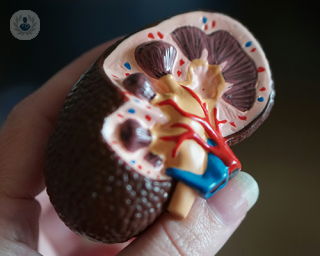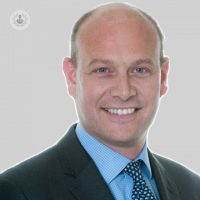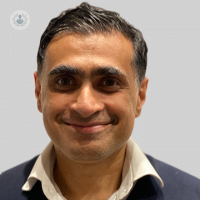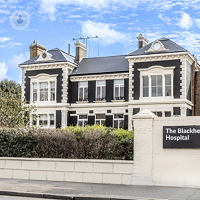What is kidney cancer?
Kidney cancer, sometimes referred to as renal cancer, is a type of cancer affecting the kidneys which most commonly occurs in people over the age of 60. It is one of the commonest cancers in the UK. There are different types of kidney cancer:
- renal cell carcinoma
- transitional cell carcinoma
- Wilm’s tumour
Kidney cancers are graded on a scale of one-four, as are many types of cancer. Cancers which are low on the scale grow slowly, while cancers on the higher end of the scale spread more quickly. This grading system helps the doctor decide on treatment and assess how the cancer will behave.

What are the symptoms?
The symptoms of kidney cancer are often difficult to detect at first, and kidney cancer is more often picked up during other routine testing. The main symptoms of kidney cancer are:
- blood in the urine (haematuria)
- pain or pressure in the side or back
- mass or a lump in the side or back (though this is often too small to detect)
Causes of kidney cancer or why it occurs
The most frequent risk factors that influence the development of kidney cancer are:
- smoking
- kidney disease
- obesity, following a diet high in fats
- drinking (alcohol)
- high blood pressure (hypertension)
- previous radiotherapy for cancer
- diabetes
- hysterectomy
- family history of kidney cancer
Can kidney cancer be prevented?
Reducing some risk factors can help in the prevention of kidney cancer, such as:
- quitting smoking
- lowering blood pressure
- maintaining a healthy body weight
- following a varied diet abundant in fruits and vegetables, and with a low fat content.
What is the treatment?
Kidney cancer, if detected early, can be cured. Treatment and outlook of kidney cancer depends on the size of the tumour and how far it has spread in the body.
The cancer cells can also be treated through freezing or heating (cryotherapy, radiofrequency ablation), embolisation (where the blood supply to the tumour is cut off), radiotherapy, or biological therapies such as immunotherapy.
If the cancer is limited to the kidney and is still fairly small, surgery can cure it. On the other hand, if the cancer has spread to other parts of the body, treatment focuses on controlling it and preventing further spread.
01-09-2013 10-24-2023Kidney cancer
What is kidney cancer?
Kidney cancer, sometimes referred to as renal cancer, is a type of cancer affecting the kidneys which most commonly occurs in people over the age of 60. It is one of the commonest cancers in the UK. There are different types of kidney cancer:
- renal cell carcinoma
- transitional cell carcinoma
- Wilm’s tumour
Kidney cancers are graded on a scale of one-four, as are many types of cancer. Cancers which are low on the scale grow slowly, while cancers on the higher end of the scale spread more quickly. This grading system helps the doctor decide on treatment and assess how the cancer will behave.

What are the symptoms?
The symptoms of kidney cancer are often difficult to detect at first, and kidney cancer is more often picked up during other routine testing. The main symptoms of kidney cancer are:
- blood in the urine (haematuria)
- pain or pressure in the side or back
- mass or a lump in the side or back (though this is often too small to detect)
Causes of kidney cancer or why it occurs
The most frequent risk factors that influence the development of kidney cancer are:
- smoking
- kidney disease
- obesity, following a diet high in fats
- drinking (alcohol)
- high blood pressure (hypertension)
- previous radiotherapy for cancer
- diabetes
- hysterectomy
- family history of kidney cancer
Can kidney cancer be prevented?
Reducing some risk factors can help in the prevention of kidney cancer, such as:
- quitting smoking
- lowering blood pressure
- maintaining a healthy body weight
- following a varied diet abundant in fruits and vegetables, and with a low fat content.
What is the treatment?
Kidney cancer, if detected early, can be cured. Treatment and outlook of kidney cancer depends on the size of the tumour and how far it has spread in the body.
The cancer cells can also be treated through freezing or heating (cryotherapy, radiofrequency ablation), embolisation (where the blood supply to the tumour is cut off), radiotherapy, or biological therapies such as immunotherapy.
If the cancer is limited to the kidney and is still fairly small, surgery can cure it. On the other hand, if the cancer has spread to other parts of the body, treatment focuses on controlling it and preventing further spread.


Cryotherapy for kidney cancer: is the treatment effective?
By Mr Christopher Anderson
2024-12-29
Cryotherapy is a procedure that destroys tissues in the body by freezing them to an extremely low temperature and the technique is used to treat early stage renal cancer. Our expert urologist Mr Christopher Anderson explains just how effective the treatment can be. See more


Cryotherapy to treat early kidney cancer
By Mr Christopher Anderson
2024-12-28
Cryotherapy kills cancer cells by freezing them. It can cure small, early-stage kidney cancer by freezing tissues at an extremely low temperature and destroying the cancer cells completely. We've asked one of our expert urologists Mr Christopher Anderson to explain how it works. See more


Kidney cancer: survival rate and treatment options
By Mr Chris Blick
2024-12-28
If kidney cancer is detected early the survival rate can be excellent. With more than 50% of cases going undetected in the UK, read more from our expert urologist Mr Chris Blick on the risk factors for developing renal cancer. See more


Robotic partial nephrectomy for kidney tumour treatment
By Mr Azhar Khan
2024-12-24
Robotic partial nephrectomy is a novel minimally invasive surgical procedure that allows urological surgeons to remove kidney tumours while preserving the healthy portion of the kidney. With advancements in robotic-assisted surgery, patients now benefit from enhanced precision, faster recovery times, and fewer complications compared to traditional open surgery. Here, Mr Azhar Khan, renowned Consultant Urological and Robotic Surgeon, provides an expert insight into the procedure. See more
Experts in Kidney cancer
-
Mr Christopher Anderson
UrologyExpert in:
- Kidney cancer
- Prostate cancer
- Laparoscopy
- Robotic surgery in urology
- Prostatectomy (prostate removal)
- Prostate biopsy
-
Mr Neil Barber
UrologyExpert in:
- Prostate
- Prostate cancer
- Kidney cancer
- Green light laser surgery
- Robotic surgery in urology
- Benign prostate enlargement
-
Mr Neil Haldar
UrologyExpert in:
- Prostate cancer
- Bladder cancer
- Kidney cancer
- Paediatric urology
- Undescended testicle (Cryptorchidism)
- Urinary tract infection
-
Dr Naveed Sarwar
Medical oncologyExpert in:
- Urological Cancer
- Kidney cancer
- Bladder cancer
- Prostate cancer
- Testicular cancer
- Ovarian cancer
-
Dr Mark Tuthill
Medical oncologyExpert in:
- Immunotherapy
- Breast cancer
- Prostate cancer
- Kidney cancer
- Bladder cancer
- Metastasis
- See all

Cleveland Clinic London Hospital
Cleveland Clinic London Hospital
33 Grosvenor Place
No existe teléfono en el centro.
By using the telephone number provided by TOP DOCTORS, you automatically agree to let us use your phone number for statistical and commercial purposes. For further information, read our Privacy Policy
Top Doctors

Thornbury Hospital - part of Circle Health Group
Thornbury Hospital - part of Circle Health Group
312 Fulwood Road, Sheffield S10 3BR
No existe teléfono en el centro.
By using the telephone number provided by TOP DOCTORS, you automatically agree to let us use your phone number for statistical and commercial purposes. For further information, read our Privacy Policy
Top Doctors

The Blackheath Hospital - part of Circle Health Group
The Blackheath Hospital - part of Circle Health Group
40-42 Lee Terrace, Blackheath, London SE3 9UD
No existe teléfono en el centro.
By using the telephone number provided by TOP DOCTORS, you automatically agree to let us use your phone number for statistical and commercial purposes. For further information, read our Privacy Policy
Top Doctors
-
Cleveland Clinic London Hospital
33 Grosvenor Place, Central LondonExpert in:
- Cardiology
- Colorectal surgery
- Minimal access surgery (keyhole surgery)
- Gallbladder surgery
- Diagnostic Imaging
- Ultrasound
-
Thornbury Hospital - part of Circle Health Group
312 Fulwood Road, Sheffield S10 3BR, SheffieldExpert in:
- Cardiology
- Colorectal surgery
- Endocrinology, Nutrition and Thyroid
- endoscopy
- Fertility
- Otolaryngology
-
The Blackheath Hospital - part of Circle Health Group
40-42 Lee Terrace, Blackheath, London SE3 9UD, East LondonExpert in:
- Vascular Surgery
- Cardiology
- Bariatric Surgery
- Colorectal surgery
- Endocrine Surgery
- General Surgery
- See all
- Most viewed diseases, medical tests, and treatments
- Immunotherapy
- Fertility preservation
- Female infertility
- CAR-T cells
- Hormone therapy
- Undescended testicle (Cryptorchidism)
- Hodgkin's lymphoma
- Genetic testing
- Testicular ultrasound
- Nipple discharge








